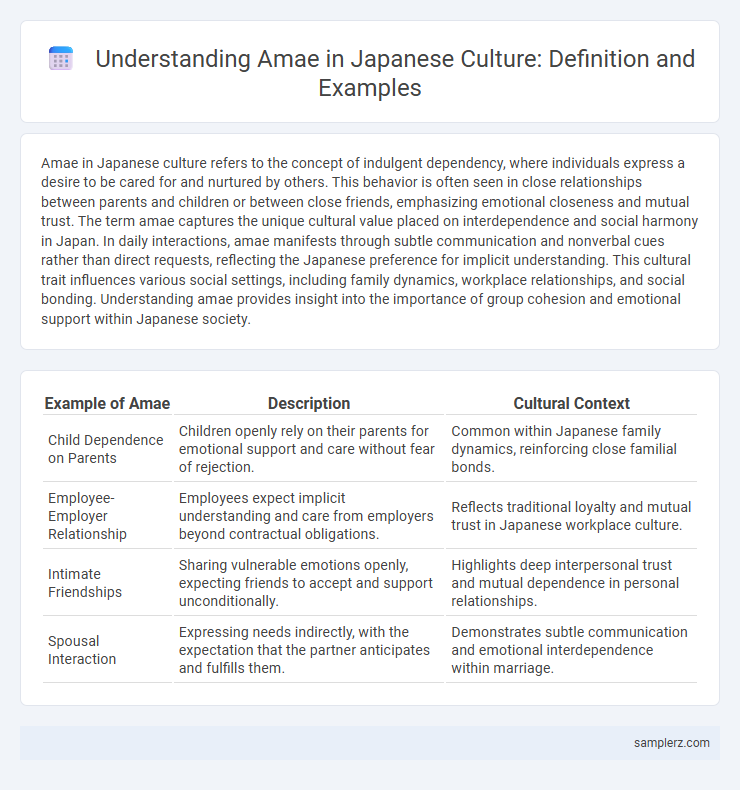Amae in Japanese culture refers to the concept of indulgent dependency, where individuals express a desire to be cared for and nurtured by others. This behavior is often seen in close relationships between parents and children or between close friends, emphasizing emotional closeness and mutual trust. The term amae captures the unique cultural value placed on interdependence and social harmony in Japan. In daily interactions, amae manifests through subtle communication and nonverbal cues rather than direct requests, reflecting the Japanese preference for implicit understanding. This cultural trait influences various social settings, including family dynamics, workplace relationships, and social bonding. Understanding amae provides insight into the importance of group cohesion and emotional support within Japanese society.
Table of Comparison
| Example of Amae | Description | Cultural Context |
|---|---|---|
| Child Dependence on Parents | Children openly rely on their parents for emotional support and care without fear of rejection. | Common within Japanese family dynamics, reinforcing close familial bonds. |
| Employee-Employer Relationship | Employees expect implicit understanding and care from employers beyond contractual obligations. | Reflects traditional loyalty and mutual trust in Japanese workplace culture. |
| Intimate Friendships | Sharing vulnerable emotions openly, expecting friends to accept and support unconditionally. | Highlights deep interpersonal trust and mutual dependence in personal relationships. |
| Spousal Interaction | Expressing needs indirectly, with the expectation that the partner anticipates and fulfills them. | Demonstrates subtle communication and emotional interdependence within marriage. |
Understanding Amae: The Heart of Japanese Interpersonal Relations
Amae, a fundamental concept in Japanese culture, describes the deep emotional dependence and mutual trust that forms the basis of interpersonal relationships, especially within families and close social groups. This behavior manifests as a desire to be cared for and accepted unconditionally, reflecting a unique cultural emphasis on harmony and empathy. Understanding amae reveals how reliance on others fosters cooperative social bonds and nurtures emotional intimacy in Japanese society.
The Role of Amae in Family Dynamics
Amae in Japanese culture manifests prominently in family dynamics through the expression of dependency, where children are encouraged to seek emotional support from parents without fear of rejection. This behavior fosters intimate bonds and mutual trust, enabling family members to maintain harmony by acknowledging each other's needs implicitly. The practice of amae helps sustain intergenerational relationships, reinforcing collective well-being and emotional security within the household.
Amae in the Workplace: Group Harmony and Dependence
Amae in Japanese workplace culture manifests through employees' reliance on mutual understanding and unspoken emotional support to maintain group harmony and reduce conflicts. This behavior encourages a soft interdependence where colleagues anticipate each other's needs without explicit communication, reinforcing trust and cooperation. Such dependence fosters collective responsibility, aligning individual actions with the group's goals and preserving workplace cohesion.
Childhood and Parental Amae: Socialization in Japan
Amae in Japanese culture is exemplified through childhood interactions where children openly depend on parental indulgence and nurturing without fear of rejection. This behavior cultivates a deep-rooted trust and emotional bond, reflecting a socialization process that emphasizes interdependence and group harmony. Parental amae fosters a supportive environment, shaping children's development within the collective cultural framework.
Amae in Japanese Friendships: Subtle Emotional Bonds
Amae in Japanese friendships manifests through unspoken understanding and mutual reliance, where friends comfortably depend on each other for emotional support without explicit requests. This subtle emotional bond allows individuals to express vulnerability and trust, reinforcing group harmony and social cohesion. Such interactions embody amae as a foundation for deep, empathetic connections unique to Japanese social dynamics.
Romantic Relationships: Expressions of Amae Among Couples
In Japanese romantic relationships, amae manifests through subtle acts of dependence and reassurance, such as a partner gently holding hands or seeking comfort during moments of vulnerability. Couples often express amae by relying on implicit understanding and nonverbal communication, fostering emotional closeness without explicit requests. This cultural dynamic strengthens intimacy by allowing partners to feel secure in mutual acceptance and unspoken support.
Amae in Literature and Popular Media
Amae is frequently depicted in Japanese literature and popular media as characters expressing a longing for emotional dependence and indulgence, often highlighting intricate family or social bonds. In novels and manga, protagonists may exhibit amae by relying on others to provide comfort and acceptance without fear of rejection, reflecting deep psychological themes. Films and anime explore amae to illustrate vulnerability and interdependence, showcasing how this behavior shapes relationships within Japanese cultural contexts.
Navigating Amae: Etiquette and Social Expectations
Amae in Japanese culture manifests through nuanced social behaviors, such as the implicit trust shown between close family members or colleagues, where one may rely on another's indulgence without explicit requests. Understanding this delicate balance requires recognizing non-verbal cues and the unspoken social contract that allows individuals to express vulnerability while maintaining harmony. Etiquette dictates that recipients of amae respond with patience and support, reinforcing group cohesion and mutual dependence within hierarchical relationships.
Amae vs. Individualism: Cross-Cultural Perspectives
Amae, a fundamental concept in Japanese culture, emphasizes dependence and unconditional acceptance within close relationships, contrasting sharply with Western individualism that prioritizes autonomy and self-reliance. This cultural divergence shapes social interactions, where Japanese individuals often expect and embrace mutual indulgence, while Western norms discourage dependence to maintain personal independence. Cross-cultural studies reveal that understanding amae enhances communication and reduces misunderstandings between collectivist and individualist societies.
The Psychological Impact of Amae on Japanese Society
Amae, a uniquely Japanese concept of indulgent dependence, profoundly shapes interpersonal relationships and social harmony by fostering mutual trust and emotional closeness. This psychological dynamic promotes a collective mindset, reducing anxiety and reinforcing social bonds through implicit expectations of care and acceptance within families and communities. The pervasive influence of amae supports societal stability by encouraging empathy, reciprocity, and cooperation in both private and public spheres.

example of amae in Japanese culture Infographic
 samplerz.com
samplerz.com